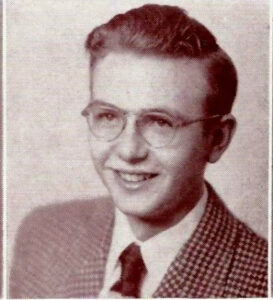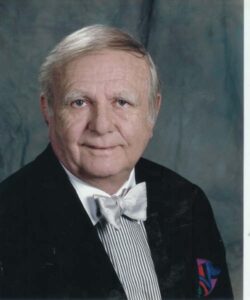
HOF 2006 – Fine Arts
Cacavas began piano lessons in grade school. After the first year, his teacher regretfully informed his parents that he had no musical ability. A few years later, Cacavas discovered the saxophone and MUSIC. At age 14 he had his own band. At 15 he went out on the road. With all the men in the service, Cacavas took his own band on the road to the Dakota dance halls.
He graduated from Northwestern University, refusing to major in music education (as a backup, he was told). He would be a composer– and he became a strong and powerful advocate for living life his own way.
He went on to serve in the United States Army Band as chief arranger. It was there he met Charles Osgood, the future CBS commentator, who was serving as the band announcer. Together they wrote the oratorio, “The Conversion of Paul,” which was performed nationally to great acclaim. Cacavas was 21 years old.
He then won two Freedom Foundation Awards, one of which was for Gallant Men, also written with Charles Osgood. This piece won a Grammy award and led to an album of the same name and it made Senator Everett Dirksen, who narrated the patriotic piece, one of the most sought after and autographed senators in Washington. During this time, Cacavas also pounded the pavement in New York, and soon everything he wrote was published.
Cacavas eloped to Mexico with Bonnie Becker. They moved to Connecticut and Cacavas developed a close professional and personal relationship with Morton Gould. He became Director of Publications for Chappell, the nation’s largest music publishing company. His acute business sense served him well and with his composing background, he worked closely with Richard Rodgers, Ira Gershwin, Lotte Lenya and the music greats of Broadway at that time.
But Cacavas loved music, not business. The family, which now included children Lisa, John Jr and Jennifer, moved to London, after a chance meeting with Telly Savalas. Telly opened the door to movies in Europe and in return Cacavas arranged, conducted and produced an album with Telly that earned Telly a number one record in Europe. And a life-long friendship developed.
Hollywood called Telly to star in the series, Kojak, and Cacavas was asked to score the series which ran five years. There was little sleep as prolific Cacavas was also scoring many of the series running at that time, such as Hawaii Five-0, Columbo, Gangster Chronicles and most of the other popular TV series. There was also a multitude of movies of the week and feature films, such as the Airport movies.
Cacavas was also a skilled conductor and composed and/or arranged extensively for orchestra and stage. He conducted from the halls of Monte Carlo, to the Academy Awards in Hollywood, and to the local public schools in South Dakota, all with equal enjoyment. He also became the official conductor for the Beverly Hills Pops Orchestra.
For many years Cacavas was a leading composer for the American school music field and had over 2,000 published works for orchestra, choir and band. Cacavas served on the ASCAP Board of Directors, a governor of the Academy of Motion Picture Arts and Sciences, as President of the Society of Composer and Lyricists, and on the advisory Music Board of Northwestern University.

During the last few years, Cacavas and famed lyricist Hal David collaborated on five albums for production libraries that they produced and recorded in Prague and London. He wrote two textbooks on film scoring, two novels and a memoir.
He was an accomplished painter and cook. He never turned down helping a young musician along the way, even when they were after his job. Cacavas was intensely proud of his family and believed it represented his greatest success. Son John and daughter Jennifer both work in the film business. Daughter Lisa Stewart is a well-known jewelry designer. Wife Bonnie is a psychiatric social worker, and long-time counselor and supporter of the Chiron Crisis Response Team in Beverly Hills. Cacavas passed away January 28, 2014.
